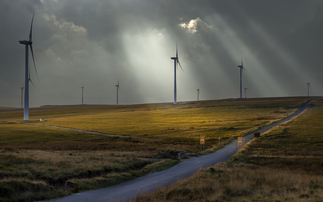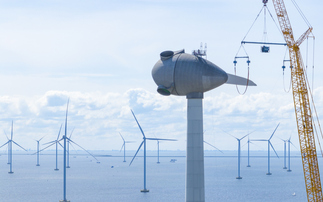Energy and Climate Change Secretary says community energy will no longer be 'policy footnote' in government
Large scale wind and solar farm developers will have to offer a "meaningful share" of their projects to communities, as part of a major new government strategy designed to boost public ownership of renewable energy.
The much-anticipated blueprint ministers are set to announce today is expected to contain a series of measures designed to encourage communities to take control of their energy supply, in some cases potentially lowering power bills.
"For too long, community energy has been a policy footnote, with all the focus on big generators and individual households - all but ignoring the potential of communities to play a key role," Energy and Climate Change Secretary Ed Davey said in a draft copy of the document, seen by BusinessGreen.
A number of sources have told BusinessGreen that at the heart of today's annoucement will sit a "pathway to shared ownership", asking larger onshore renewable energy developers to offer a significant share of ownership to communities.
Some organisations had called for the UK strategy to mirror the Danish model, whereby communities are automatically offered 20 per cent ownership of a project. However, the government is thought to have shied away from stipulating a specific figure and instead called for developers to offer a "meaningful share".
Shared ownership with communities is not new to the renewable energy industry, with developers such as Falck energy offering bonds to local residents to buy one wind turbine from its project and a similar policy already operating in Scotland.
Today's paper will not propose a new law on community ownership, but ministers will threaten to legislate on the issue if the market fails to meet its demands in future.
The government document estimates that community-owned renewable energy projects could generate enough power for more than one million homes by the end of the decade and predicts high demand for new projects. A survey on behalf of the government found that nearly two-fifths of people would invest in a project if it helped to lower their energy bills.
The wide-ranging strategy is also expected to include plans to double the feed-in tariff threshold for community energy projects from 5MW currently to 10MW. The government will issue a consultation on the proposed changes, which could make solar PV arrays on office or school roofs, community-owned wind turbines, and hydro power schemes more financially viable.
Significantly, the government is seeking approval from the European Union for the £3bn Green Investment Bank (GIB) to invest in community-owned projects. The strategy confirms that the UK recently started informal discussions with the European Commission about potentially including small-scale onshore wind energy and small-scale hydro within the bank's lending criteria.
"Should this proposal be accepted, it would become possible for GIB to provide wholesale finance these sectors, including community-based projects," the document states, adding it hopes to progress the matter early next year.
In addition, the government will today launch a £10m fund to help boost the deployment of community-owned energy schemes in urban areas that will sit alongside a similar Rural Community Energy Fund launched last year.
The Department for Energy and Climate Change (DECC) will also increase its focus on community energy by creating a dedicated team within the department, and set up a number of working groups to tackle issues around planning, permitting, grid connections, and offering lower cost energy supply contracts to host communities.
The paper was welcomed by Community Energy Coalition (CEC), a group which includes the Co-operative, National Trust, Campaign to Protect Rural England, Church of England, Energy Saving Trust, NUS, and Co-operatives UK.
Russell Gill, head of membership and social goals at The Co-operative, said the strategy was a major step forward for a part of the industry that has largely been overlooked until now by government.
"The Government's new strategy is positive news for the vibrant and growing community energy sector," he said in a statement. "As its supportive measures are realised, we are optimistic that a huge increase in community and co-operatively owned projects will be forthcoming, giving people the ability to bring down household energy bills."
Jennifer Webber of trade association RenewableUK said the industry would work with the government to address the barriers to further developing community energy schemes. "RenewableUK is committed to helping communities engage in renewable energy, and sponsored a report from Respublica on this last year," she said.
A DECC spokeswoman refused to comment on the specific details of the new strategy until after it is released today.









